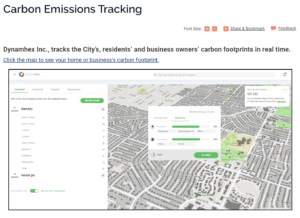Prairie Village residents and businesses can monitor their own and their neighbor’s alleged carbon footprint on the city website, and at least one resident is concerned about privacy issues.
 In the Fall of 2020, Prairie Village entered into an agreement with Kansas City-based Dynamhex for a software program to analyze and report emissions data. According to the Minutes of a September 21st City Council meeting, a vote of 11-1 approved a one-year, $12,000 contract, renewable yearly. At the same meeting, council members passed resolutions supporting the Climate Mayors Network and the Paris Climate Agreement on behalf of the city’s 22,000 residents. Ashley Freburg, Public Information Officer for Prairie Village, says the city is now paying $9,000 for the service.
In the Fall of 2020, Prairie Village entered into an agreement with Kansas City-based Dynamhex for a software program to analyze and report emissions data. According to the Minutes of a September 21st City Council meeting, a vote of 11-1 approved a one-year, $12,000 contract, renewable yearly. At the same meeting, council members passed resolutions supporting the Climate Mayors Network and the Paris Climate Agreement on behalf of the city’s 22,000 residents. Ashley Freburg, Public Information Officer for Prairie Village, says the city is now paying $9,000 for the service.
Anyone — resident, business owner, or Sentinel reporter — can enter a city address on the Carbon Emissions Tracking interactive website, get a report on carbon dioxide production, and sign up for recommendations to reduce carbon footprints.
Freburg offers what the city hopes to achieve with this effort:
”With the help of Dynamhex, Prairie Village hopes to identify and reduce energy costs and pollution. The City will use the information gathered to inform their (sic) long-term strategy to build a healthy community – including urban planning, development and purchasing decisions. By knowing the distribution of emissions across the City, the City can better set emission targets. These targets will influence policy-making and program development in ways that can reduce these emissions over time. A data-centric tool enables the City staff and leadership to identify community partners who can join them in addressing concerns of energy costs, environmental pollution and community health.
“The Paris Climate Accord calls for nations and residents to collectively reduce their emissions – and the U.S. has set a target to reduce emissions to 50% from 2005 levels by 2030. The Environmental Committee recommended the purchase of carbon emission tracking services from Dynamhex to establish a baseline for city-wide emissions, including individual residential and commercial properties. Based on the information gathered, Dynamhex offers personalized solutions to reduce emissions. Members of the community can access and use the tool to examine emissions within their own homes and invest in energy upgrades, if they wish to do so.“
Freburg added no resident or business is compelled to take action based on recorded CO2 emissions. No rewards or penalties are provided as incentives.
Dynamhex CEO Sanwar Sunny says his company’s information gathering is transparent and not invasive:
Homeowner Jennifer Falk, however, does not share others’ enthusiasm about the partnership between her city and Dynamhex. She sees an ulterior motive in the effort:
”I’m concerned it’s devaluing the homes to make way for more teardowns. Really, why did our city hire this company? I fear it’s more of a push to influence tear-downs. New homes, maybe better for energy use?”



